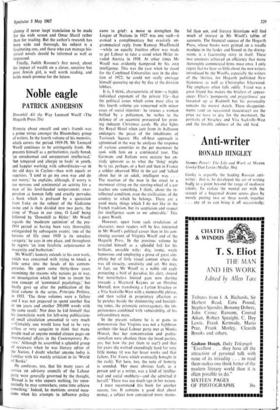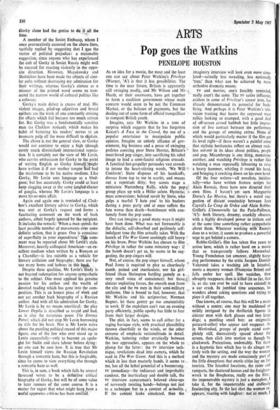Smarty Petrel : The Life and Work of Maxim Gorky
Dan Levin (Muller 30s) -r. Anti-writer
RONALD HINGLEY
Gorky is arguably the leading Russian anti- writer : that is, he developed the art of writing badly to a point beyond the range of mediocre talents. To violate the mental ear with the screech of a fingernail drawn across glass by merely putting two or three words together . . . any of us can bring it off occasionally; Oorky alone had the genius to do it all the time.
A member of the Soviet Embassy, whom I once provocatively accosted on the above lines, tactfully replied by suggesting that I as the victim of political prejudice: a reasonable suggestion, since anyone who has experienced the cult of Gorky in Soviet Russia might well be excused for reacting violently in the oppo- site direction. However, Mayakovsky and Sholokhov have been made the objects of simi- lar cults without destroying my admiration for their writings, whereas Gorky's stature as a misuser of the printed word seems krt tran- scend the narrow world of cultural politics like a colossus.
Gorky's main defect is excess of zeal. His violent images, piled-up adjectives and brutal epithets are the work of one constantly striving for effects which fail because too much striven for. But Gorky was a fundamentally sensitive man (as Chekhov noticed), which makes his habit of battering his readers' nerves to an insensate pulp all the more difficult to eltplain.
The above is not the general view, or Gorky would not continue to enjoy a high (though timely much diminished) international reputa- tion. It is certainly not the view of Mr Levin, who carries enthusiasm for Gorky to the point of writing English as Gorky himself might have written it if our mother tongue had had Om misfortune to be his native medium. Like Gorky, Mr Levin uses language as a blud- geon; but less accurately. Gorky could at least keep slugging away at the same jangled,Cluster of ganglia, whereas Mr Levin's language is a more hit-or-miss affair.
Again and again one is reminded of Chek- hov's excellent literary advice to Gorky, which was sent at Gorky's request and forms a fascinating comment on the work of both authors, albeit largely ignored by the recipient. It includes the remark: 'When a man spends the least possible number of movements over some definite action, that is grace. One is conscious of superfluity in your expenditure.' Tiiis com- ment may be repeated about Mr Levin's style. Moreover, heavily colloquial American—an ex- cellent medium when written by a Runyon or a Chandler—is less suitable as a vehicle for literary criticism and biography; there are far too many bums and hoboes in this .41.a.
Despite these qualities, Mr Levin'sliudy is not beyond redemption for anyone sympathetic to the subject. One must applaud his genuine passion for his author and the wealth of devoted reading which has gone into the com- position. This is an honest piece of Africk and not yet another hack biography of a Russian author. And with all his admiration for Gorky, Mr Levin is by no means uncritical: the play Lower Depths is described as turgid and bad, as is also the notorious poem The Stormy Petrel; which did not stop Mr Levin borrowing its title for his book. Nor is Mr Levin naive about the puzzling political record of this major figure, one of the few who ever stood up to Lenin successfully—only to become an apolo- gist for Stalin and slave labour before dying: no one can be sure how. It is true that Mr Levin himself views the Russian Revolution through a romantic haze, but this is forgivable, since he seems to view everything else through a romantic haze as well.
This is, in sum, a book which fails by several thousand versts to be a definitive critical biography of Gorky, but will be of some value to later runners of the same course. It is a matter for regret that what might havepeen a useful apparatus critic. us has been omifted.



































 Previous page
Previous page